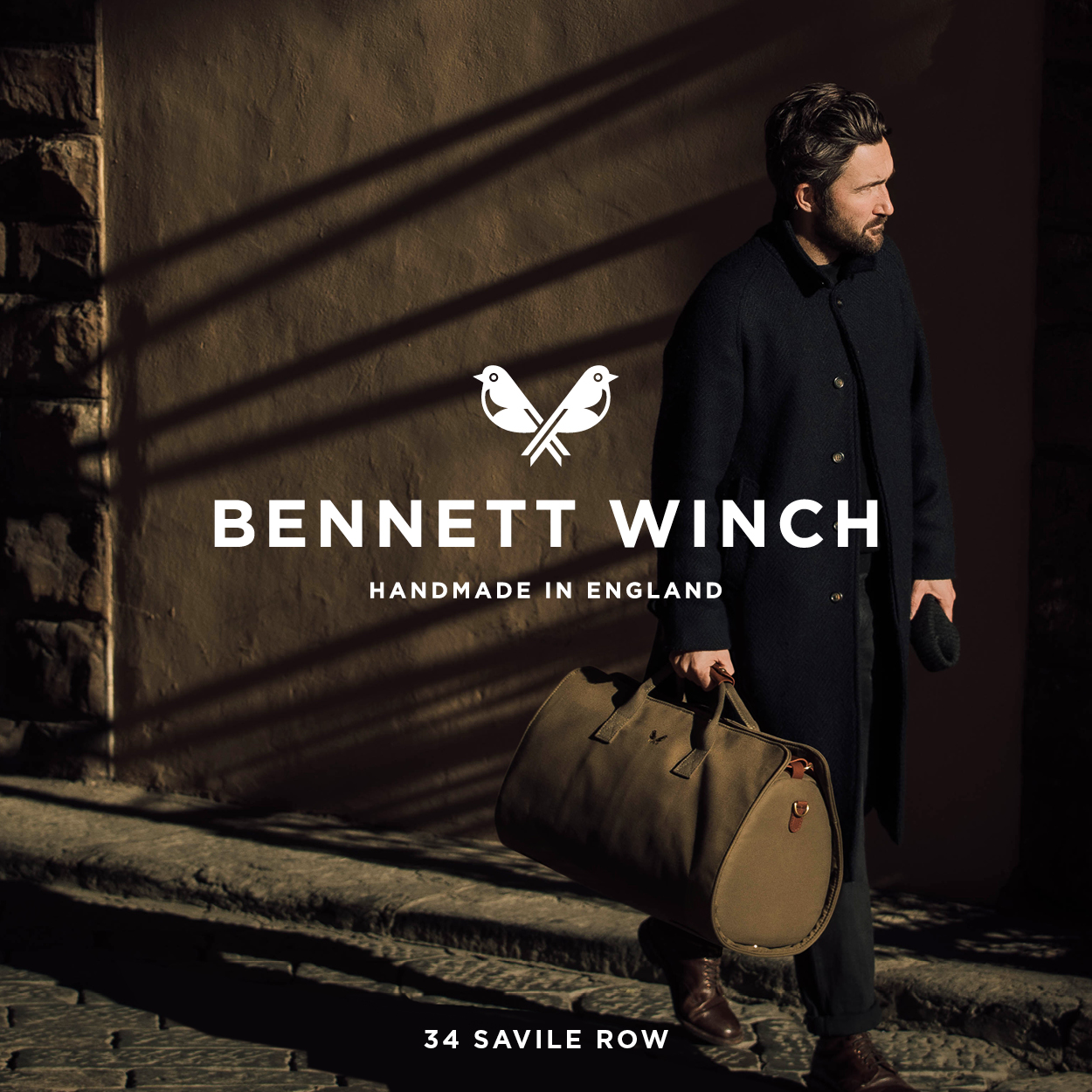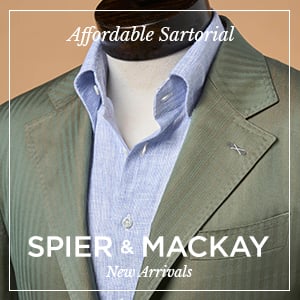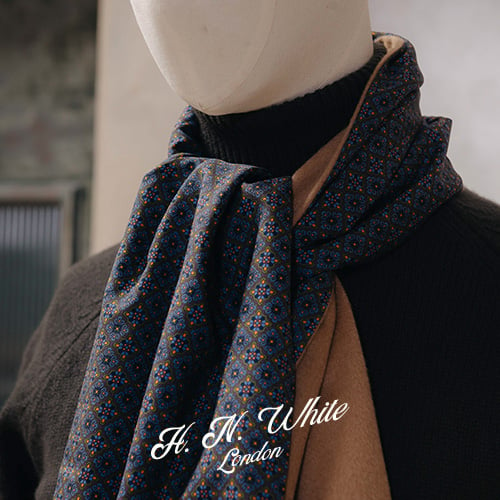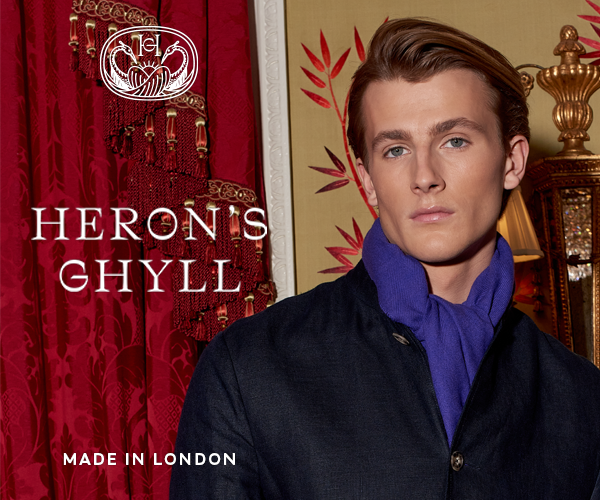Akshat of 100 Hands was a little nervous before this, but he needn't have been. He is one of the most thoughtful people out there on shirts, their fit and their make.
Partly, this is because he's simply been through it all: building a shirt factory from the ground up, to the point that it makes one of the best hand-sewn shirts in the world; and teaching himself to fit bespoke shirts, with the help of the masters in the factory.
But it's also a result of how open and engaging he is. Everyone says this - there is no waffling, no evasion. He seriously considers every question you put to him, before answering in the most direct way.
These were some of the reasons I thought he would be good for this video.
I wanted to discuss not the process of ordering a shirt (we'll do that video later) but of fitting it.
Men are often very nervous themselves in this situation, and don't really know what they should comment on, whether it's the right time to do so, and if they'll look stupid when they do.
Hopefully Akshat's advice, and seeing me being fitted and pinned, will help. We try to discuss everything a customer could be thinking or worrying about - but if you have any other questions, please leave them below and myself or Akshat will answer.
Oh, and try to ignore how fat I look when I sit on the chair and slouch. It is not a flattering look.
Other videos in this series include:
- How to order bespoke shoes
- How to look after tailoring
- How polish shoes part 1 and part 2
- How to fold a handkerchief
- How to look after suede jackets
- How to look after good shoes
Many, many thanks to Akshat and Varvara of 100 Hands.
What to learn more about how Permanent Style is funded? Details here: 'Is this an ad?'




























Simon,
Great video. On the topic of shirts, have you come across Panama fabric? Seems to be similar to Oxford fabric.
Simon
Was the white shirt you were being pinned in a try on?
No, it was a ready-made shirt, just for illustrative purposes
Do you know when 100 Hands are back in London?
No, sorry. Better to contact them directly probably, to get on the list for updates
The shirt I was wearing as reference when meeting Akshat in Gothenburg, Sweden was the PS denim shirt! I ordered the Japanese dark denim and after two washes I will need to do some adjustments but most important I think the shoulder fit is 90% good and the collar is fantastic. Looking forward to meet Akshat (and his wife) next time in Sweden.
Very useful video .
I didn’t realise that the type of cloth necessarily affects the fit particularly on a first bespoke shirt.
also the point about creases being necessary on the back ….. we’re so used to reading about eliminating creases on the blog in relation to jackets.
Simon , might I suggest you do a summary of salient points and the end of each video as otherwise there’s a lot to take in .
Also with 99 hands being India based are they able to emulate the beautiful open Italian collar ?
Nice point, will do.
And yes, Varvara and Akshat are actually based in the Netherlands and sell around Europe, so they’re aware of different European styles
Good video! Very nice atmosphere at 100 Hands. Do they wash the cotton before the fitting because of shrinkage?
Yes, cottons are always pre-washed, though with some fabrics there is often a small amount of shrinkage in further washes too
Hello Peter, we often pre-shrink it but sometimes not depending on fabric as Simon guided.
Thanks
Akshat
Great video.
Simon, the stiped shirt we see some close ups on, presumably the one you’re wearing throughout the interview bit – is that a linen/cotton mix? It looks quite nice and airy, not sure why.
It’s pure cotton actually, an organic Japanese one, quite nice and slubby
Simon,
Great video – have come across with following that when hands are down (vertical to the body) the length is fine but at some shirts when the hands are going to a horizontal position (on a desk) there is an inwards – it affects the length. This change is not welcome when we wear a jacket. Could you please ask what is the tailoring detail that minimizes this length change at various hands positions.
Thank you in advance.
Sure.
When your arms are at your side, there should still be some excess material in the sleeve. You can probably see it in the sleeve, but also if you undo your cuff, you’ll see that the sleeve drops a little lower on your hand, as it uses that excess.
It is this excess that is used when you extend your arm upwards and outwards, and stops the cuff riding up inside a jacket sleeve.
When your arm is down, the position of the cuff on the hand is not controlled by how long the sleeve is, but rather by the tightness and shape of the cuff.
Hope that makes sense – do let me know if not
If the cuff closure is measured correctly around your wrist, it is that which stops the sleeve riding up.
That can help with the cuff and sleeve not getting caught on the inside of the jacket sleeve, and keeping it in place. But there has to be excess in the sleeve length as well. Otherwise that tight cuff will be pulling at the rest of the shirt body, and be rather uncomfortable.
Not excess, but the right amount. If you have excess, and the cuff measurement is too loose, the cuff will not sit in the right place.
This is perhaps an issue of language.
By excess, I mean more material than merely the length of your arm when at your side. That is the right amount, and the cuff dimensions determine where it sits on the hand.
Very helpful interview to those off us new to bespoke or being measured for clothing particularly the part about dressing with a shirt and possibly jacket when at the fitting so you can describe and show the fitter what you would like. As a beginner to this I found the sheer volume of considerations of collar, cuffs, button style and positioning a great deal to take in and that’s on top of the myriad of cloths available.
Hi Kevin, perhaps Simon can elaborate. The main thing you need to focus on fitting in short would be firstly, the shoulders area is clean and correct and then the body looseness & lengths are good. Just with this much you might be able to get a considerable good fit already.
Simon,
Nice video and I’m extremely pleased that you’ve given further coverage to 100 Hands. Now that I have several shirts from them in both their Gold and Black lines, I can say that their fit is as good as any other shirtmaker I’ve used. Certainly, the handwork in the bottonholes is the best I have seen.
I personally do not like darts in the back of my shirts. Darts are usually covered by a jacket or sweater but I’m not a person who wears jackets that often. Consequently, darts are noticeable, particularly on patterned fabrics. Akshat worked meticulously to get a perfect fit for me, particularly with reference to the ‘balance’ that he talks about in the video. He also convinced me to try the 100 Hands BD Royal Collar because of my face shape and long neck. It has a slightly longer point on the collar. Initially sceptical, I did go for it and very glad I took his advice. Akshat is also very honest in giving his valued opinion on which shirt fabrics/patterns will benefit most from their top of the (Gold) line shirts. Advice which I personally very much appreciated.
Another point of fit that I found particularly important and worth emphasising is the position of the top button on the front of the shirt, the one below the collar button. If like me, some of your readers like to wear a tie as well as sometimes keep an open neck, the position of that button becomes quite important, not just from the point of how much is revealed but on how much “pull” you get on it from across the shoulders. Not sure if I’ve explained that particularly well but I’m sure you will clarify if I haven’t.
Both Akshat and his wife are delightful company.
Thanks, and I think you have explained that well.
I myself move all the buttons up a little bit, so that I can undo the collar and the next button but not show off too much chest.
So kind of you and we are definitely always happy to service you. Kind regards, akshat
Having recently commissioned some MTM shirts I was asked if I wanted ‘darts’ which I declined but was puzzled at being asked .
Surely darts are what you do to RTW shirts to make them look more fitted?
P.S. good to see Akshat replying to comments here .
You do Robin, but it’s not quite as straightforward as that. Sometimes darts can give you slightly more control in altering the back – in the same way that you might alter a suit by using the centre back seam or the side seams, depending on what you wanted to achieve.
But if people don’t like darts (I don’t mind them myself) the maker can try to do it through just the side seams.
Hi Robin, Darts are not always bad. They are not necessary in most cases for bespoke but for more follow back it’s not necessarily a bad thing to allow clean larger section as the balance between front and back has to be maintained as well. For some it’s rather good to have. And few prefer to keep them as they change their weight often so instead of buying 8 more shirts they can play a little from the darts so not necessarily a bad option. Fit wise it’s needed at times but often can be excused in bespoke. I often don’t answer here as Simon takes the lead but where needed I share my personal view and hope it helps. Thanks 🙂
I love Akshat’s overshirt. Is this a safari? Wonder how/where you might go about commissioning something like this that is neither a shirt nor a jacket? Similar in some ways to your Budd safari, Simon. Any tips on commissioning or finding something similar M2M/off the rack?
Thanks.
A lot of people are doing something like this now Harry, and I’m sure you’ll see a flurry of them in Spring/Summer collections.
The Armoury does its safari jacket and City hunter, for example. Private White does a shacket. Thom Sweeney does something similar. And most of the shirtmakers now offer some form of overshirt.
Thanks Simon.
It looks like this exact safari jacket is available at The Rake (unless you wear a size S): https://therake.com/100-hands-navy-cotton-denim-unstructured-safari-jacket.html
Dear Akshat (and Simon), Thank you for this. Impressive. I can’t wait to try. Are there any opportunities for doing shirts when the customer is based in Hong Kong? Thanks
Hi Jan, thanks for the kind words. In case you have not already sent email, please do so at [email protected] and I will try to arrange something for you in Hong Kong (together with a potential partner there). You might be a customer there already as they carry an interesting collection. Pls let me know.
Thank you, Simon, for sharing this great video. I hope that you will consider doing a video (or series) on the fitting of a bespoke suit.
May I ask which jacket you are wearing during this interview.
It’s all in the works, yes.
The jacket is my donegal tweed (W Bill) from Steven Hitchcock – full post here
I must confess a fondness for Zegna made to measure shirts. Certainly not bespoke, but very well made with beautiful finishing, buttons and fantastic fabrics. The shirts always look great upon arrival, launders extremely well, and last a long time. The cuffs and collars don’t fray and the shirt ages beautifully.
Simon
Getting my first bespoke done… is it a bad sign if at first fitting they want to rebaste and have another go in a week or two (jacket was definitely too small and had some rumpling in the chest)…. should I be nervous that I have just wasted a lot of money?
Not necessarily, no. They could be being fastidious, or they could have made a mistake. Either way it probably won’t be a waste, it might just take longer
OK, must admit I was a bit worried by the fist fitting! It is by someone you write v highly about,,, Let us see!
For Evan: Simon’s comments are correct, however the shoulder yoke and cloth width across the back panel should also be taken into account. All three are connected and bear stress as the body moves and the cloth tightens. So, as the arms are raised to the front the shoulders also lift and the upper back stiffens as muscles respond to the posture. If seated, shoulders still lift but there’s is a leaning forward over the desk. This causes lengthening of the back and slight expansion of the back width: cloth at the back is stressed, whilst cloth at the front becomes loose. In all of these things it is worth considering the bio-mechanical movement of the body. A well cut shirt will be shaped to the physique with a small amount of additional cloth to adapt to this movement. RTW is cut to fit everywhere in a size range. The margins allowed for movement are therefore greater. This can cause loose fit, bagging, or, if wrongly sized, tightness and restricted movement.
Of all the shirts I’ve had Made I’ve never had anyone get me to sit down for a fitting, Akshat seems extremely thorough. I understand from previous posts Luca Avitabale is the shirtmaker you use most, have you considered using 100Hands instead?
Yes, I’ve used 100 Hands a couple of times (including for that striped shirt in the video). I just haven’t gotten around to doing a full review yet
Can we expect to see any collaborations soon?
Great video! And I am glad to see positive comments here on 100 hands shirts. I also have a couple of bespoke shirts from them so far and am really satisfied with their fittings as well as their unparalleled handworks.
Although I have never had the chance to meet Akshat, his wife Varvara is a very nice person. Every time I see her, I am really excited to feel their passion for making the best shirts in terms of both aesthetic and fitting.
Actually one of my shirts by 100 hands is made in PS oxford fabric and I really love its coarseness and softness. I must try PS stripe oxford recently launched next time I visit them.
Hi Simon….how do 100Hands compare with D’Avino, based on your experience thus far?
Very well. If anything a better make (same amount of handwork but more precise) and probably better stylistically (though that’s more subjective and personal)
On a similar note, how does 100Hands compare to your preferred Italian makers in terms of functional handwork (collar sown on the round, hand attached sleeves, etc.). I sense 100Hands may include all of that, plus additional handwork?
Yes, exactly 100 Hands have both types of handwork
Great video! And I am glad to see positive comments here on 100 hands shirts. I also have a couple of bespoke shirts from them so far and am really satisfied with their fittings as well as their unparalleled handworks.
Although I have never had the chance to meet Akshat, his wife Varvara is a very nice person. Every time I see her, I am really excited to feel their passion for making the best shirts in terms of both aesthetic and fitting.
Actually one of my shirts by 100 hands is made in PS oxford fabric and I really love its coarseness and softness. I must try PS stripe oxford recently launched next time I visit them.
Who in Jermyn St, Savile Row etc makes the softest shirt collar?
I wouldn’t go to a traditional English shirtmaker for a soft collar – I’d use one of the visiting Italians, or a made to measure like Drake’s, who have an English factory but do soft and unlined collars. If you want English and bespoke it might be worth trying Wil Whiting
A great video. That indeed covers many aspects from the tailors and clients side. Akshat and his family are by far our greatest competitor and reference for shirt tailoring. Keep on the great work.
Hi Simon,
I’d love to get your take on the LVMH owned brand “Pink” shirtmaker?
For their price, what I’ve seen on Instagram and what I’ve read, they have single needle stitching, off-set side to arm seam, floating canvas pattern matching, good quality cotton, they seem to be good.
I’m particularly impressed with the pattern matching as I have only seen pattern matching from shoulder to sleeve on a £480.00 Berluti RTW shirt.
Thanks,
Joel
Pink are a decent make of shirt, and I do like some of their more recent collections. However, I would always go a little more expensive and get MTM from someone like Simone Abbarchi, where I could get a better fit and pick any design options I wanted.
The only reason not to do that would be if there were particular cloths I couldn’t get from a bespoke maker. Eg some of the linens in the current Thomas Pink range you won’t find in any bespoke bunches, as they all tend to be more conservative.
Hi Simon,
I’m finally taking a sartorial dip into the world of bespoke and starting with shirts (as my office skews to the more casual) having made an appointment with Luca Avitabile when he’s next in London. Seems he no longer allows a single shirt for a first order so this will be a little more of an investment then I had originally planned for but one has to start somewhere. I’m thinking of starting with one white shirt and one blue. The blue with a button down collar (am going to ask about using the same collar that you developed with him) and for the white, a spread. My hope is there might be a spread option that can work fairly well without a tie. Do you have any suggestions on this?
As I’ve never done this before I’m slightly nervous and want to make sure I’m walking in with as much information for Luca as I can. To this, I’ve re-watched the video you made with Akshat of 100 Hands and I obviously already have an idea of shirt colour and collar. I know I’ll want barrel cuffs on both. Fabrics are a mystery to me still so will need to rely on his guidance though I have tried to familiarise myself with your article on shirt fabric selection. I’ll also be wearing a shirt that’s a favourite – mostly because of its fabric so may take some guidance from that. I believe that just leaves the question of buttons? What would the most traditional option be for this?
Lastly, I recall once seeing a video with a shirtmaker (not on your site) where he mentioned that unlike many other tailors, they would ask the customer to sit whilst being measured to ensure any “spread” in the waist is accounted for (your video with Akshat mentions this as well). This makes a lot of sense to me so am surprised if this isn’t a common practice. Is it something Luca would account for or would it be something I’d need to ask about specifically?
If there’s anything else you think I should be forearmed with, I’d appreciate any advice you can offer.
It sounds like you’ve prepared very well and thought of almost everything, to be honest. At this stage my biggest piece of advice would be to not stress too much and accept that there will always be something you’d change on a subsequent shirt.
On the collar, go with the standard spread Luca makes for me. It works pretty well without a tie – but do tell him you intend to do this, in case he wants to cut it a touch higher as a result.
On fabric, probably start with some standard poplins, but talk to Luca about how and where you plan to wear the shirts, and see what he says too.
On buttons, again I’d go with his standard mother of pearl. The only variation to consider is perhaps chunkier ones, but personally I don’t like them so much.
Lastly on sitting down, most shirtmakers take that spread in the waist into account when they measure you standing up. It’s not as if men vary much in how their belly spreads when they sit down. However, do make sure to try sitting down when you have a fitting. This is more about communicating your preferences, though, rather than seeking accuracy.
I hope that helps. Do shout if you have any other questions.
Simon – I don’t believe this has been covered before but as I have my very first bespoke appointment coming up I wanted to ask about the communication of budget. As I’m a first time customer with the shirtmaker I’ll be asked to order at least two shirts and have been given a minimum price for this (different material being the obvious variable). I’ll have to say from the start that I need to keep that in mind as my budget as we discuss options but that’s obviously not the most comfortable discussion to have.
In all the articles of yours that I’ve read, I don’t recall this aspect of bespoke being mentioned, i.e. does a tailor ask what your budget is? When discussing cloth do they mention the price or what the overall price of the finished garment will be if you select a particular garment or is the view generally, if you have to ask, you shouldn’t be here?
I wouldn’t worry too much about asking about price – you should do it, and the maker should be able to inform you.
Hi Simon, great video. I am interested in getting a RTW shirt from 100 hands and I will be getting the sleeves lengthened from their standard slim fit RTW shirt which will be at no extra charge. I wanted to get your opinions on how this shirt fits me and how much I would benefit from going bespoke instead (weighing up against the upcharge)? Any feedback on this fit would be very much appreciated! Thanks in advance.
Hey Jim,
It’s very hard to say from a single static picture, but I would expect that you would get less collapsing of the cloth at the sides of your chest and back, which probably comes from shoulders that are a little more sloping than the standard shape. Then there are things you point out, like the sleeves being a little too short.
You might also get better handwork, depending if this is 100 Hands bespoke you’re going to, and which level of RTW you’re starting from.